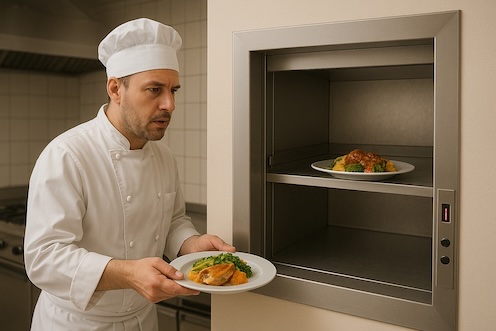A new restaurant specially installed a food delivery elevator during preparation, hoping to speed up the serving process and reduce the workload of employees. At the beginning, everything went smoothly, but soon problems arose: the car capacity was insufficient and the large tray couldn't fit in; Slow operation, delaying the delivery of food; Minor problems keep recurring and often come to a halt. The equipment that was originally expected to improve efficiency has become an obstacle to customer experience.

Misjudgment during procurement
Later, upon reviewing the situation, the restaurant discovered that the root cause of the problem was not accidental, but rather a pit that many peers had stepped into before. When making purchases, they often blindly lower prices while ignoring the actual needs of the restaurant, such as load-bearing capacity, speed, and frequency of use; Some managers lack professional knowledge and can only rely entirely on supplier recommendations, resulting in the purchase of elevators that are not suitable for catering scenarios.
After sales and safety concerns
During use, maintenance issues become more prominent. Once the equipment malfunctions, the service provider responds slowly and parts are out of stock, often causing the elevator to shut down for several days. The fast-paced catering industry can directly disrupt the service chain. At the same time, hygiene hazards are also underestimated: elevators with unreasonable design or inconvenient cleaning are prone to accumulate dust and oil fumes, ultimately affecting food safety.
The facts revealed by the investigation
Industry research data shows that:
More than two-thirds of restaurants believe that elevator efficiency did not meet expectations;
More than half of the businesses have experienced service interruptions due to elevator malfunctions;
70% of customers complain about 'slow serving', which is related to elevator delays;
40% of the equipment has cleaning dead corners.
The True Revelation
A qualified catering elevator must meet three requirements: high-frequency durability, hygiene and safety, and space matching. However, in reality, these key indicators are often overlooked during the procurement phase. Elevators are not simply a cost, but a systematic investment that directly affects operational efficiency and customer experience. The short-term budget saved often becomes a long-term hidden danger in the later stage.
The truth behind Cold Food
For diners, waiting too long or serving cold dishes may not necessarily be a problem with the kitchen, it may just be that an inappropriate food delivery elevator is quietly "falling off the chain".
